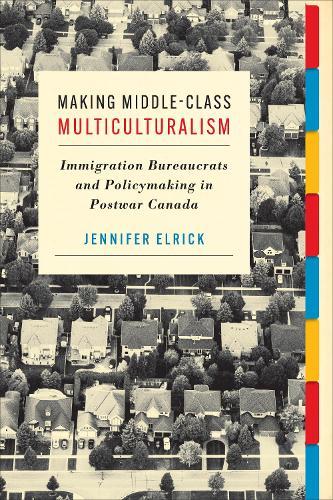Full Product Details
Author: Jennifer Elrick
Publisher: University of Toronto Press
Imprint: University of Toronto Press
Dimensions:
Width: 15.20cm
, Height: 2.00cm
, Length: 23.10cm
Weight: 0.440kg
ISBN: 9781487527778
ISBN 10: 1487527772
Pages: 277
Publication Date: 17 January 2022
Audience:
Professional and scholarly
,
College/higher education
,
Professional & Vocational
,
Tertiary & Higher Education
Format: Hardback
Publisher's Status: Active
Availability: Temporarily unavailable

The supplier advises that this item is temporarily unavailable. It will be ordered for you and placed on backorder. Once it does come back in stock, we will ship it out to you.
Reviews
""This terrific book draws back the curtain on how case-by-case decisions on who to let in and who can stay - in opposition to official entry and deportation regulations - helped reshape Canada's immigration policy to be colour-blind and centred on economic merit. Beyond the Canadian story, Elrick shows that changes in immigration law are not just about politics, foreign-relations, and economic pressures, but also lie in the culturally infused boundary work of civil servants, who can shut people out but also nudge doors open."" --Irene Bloemraad, Class of 1951 Professor of Sociology and Chair of Canadian Studies, University of California, Berkeley ""In this outstanding book, Jennfier Elrick shows how government officials in postwar Canada engendered a major shift from a race-based, white-settler approach to a multicultural model in the space of just fifteen years. This is a hugely original and important contribution, which both challenges our understanding of Canada's brand of multiculturalism, and encourages us to rethink the role of government in immigration.."" --Christina Boswell, Professor of Politics, University of Edinburgh "" Making Middle-Class Multiculturalism is a must-read for anyone seeking to understand Canada's move from race-based to skills-based immigrant admissions. Based on meticulous archival research on bureaucrats' decision-making practices, Jennifer Elrick compellingly shows how in the postwar era class came to mediate the impact of race on immigrant selection. This book will be an instant classic in the field of Canadian immigration policy."" --Antje Ellermann, Professor of Political Science and Founding Director, Centre for Migration Studies, University of British Columbia
Making Middle-Class Multiculturalism is a must-read for anyone seeking to understand Canada's move from race-based to skills-based immigrant admissions. Based on meticulous archival research on bureaucrats' decision-making practices, Jennifer Elrick compellingly shows how in the postwar era class came to mediate the impact of race on immigrant selection. This book will be an instant classic in the field of Canadian immigration policy. - Antje Ellermann, Professor of Political Science and Founding Director, Centre for Migration Studies, University of British Columbia In this outstanding book, Jennfier Elrick shows how government officials in postwar Canada engendered a major shift from a race-based, white-settler approach to a multicultural model in the space of just fifteen years. This is a hugely original and important contribution, which both challenges our understanding of Canada's brand of multiculturalism, and encourages us to rethink the role of government in immigration.. - Christina Boswell, Professor of Politics, University of Edinburgh This terrific book draws back the curtain on how case-by-case decisions on who to let in and who can stay - in opposition to official entry and deportation regulations - helped reshape Canada's immigration policy to be colour-blind and centred on economic merit. Beyond the Canadian story, Elrick shows that changes in immigration law are not just about politics, foreign-relations, and economic pressures, but also lie in the culturally infused boundary work of civil servants, who can shut people out but also nudge doors open. - Irene Bloemraad, Class of 1951 Professor of Sociology and Chair of Canadian Studies, University of California, Berkeley
Author Information
Jennifer Elrick is an assistant professor in the Department of Sociology at McGill University.




